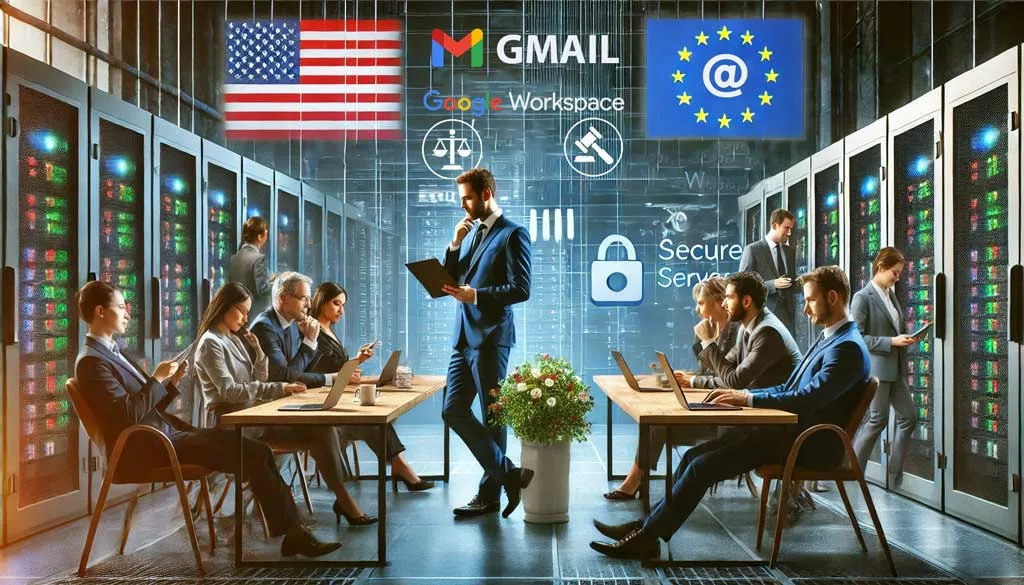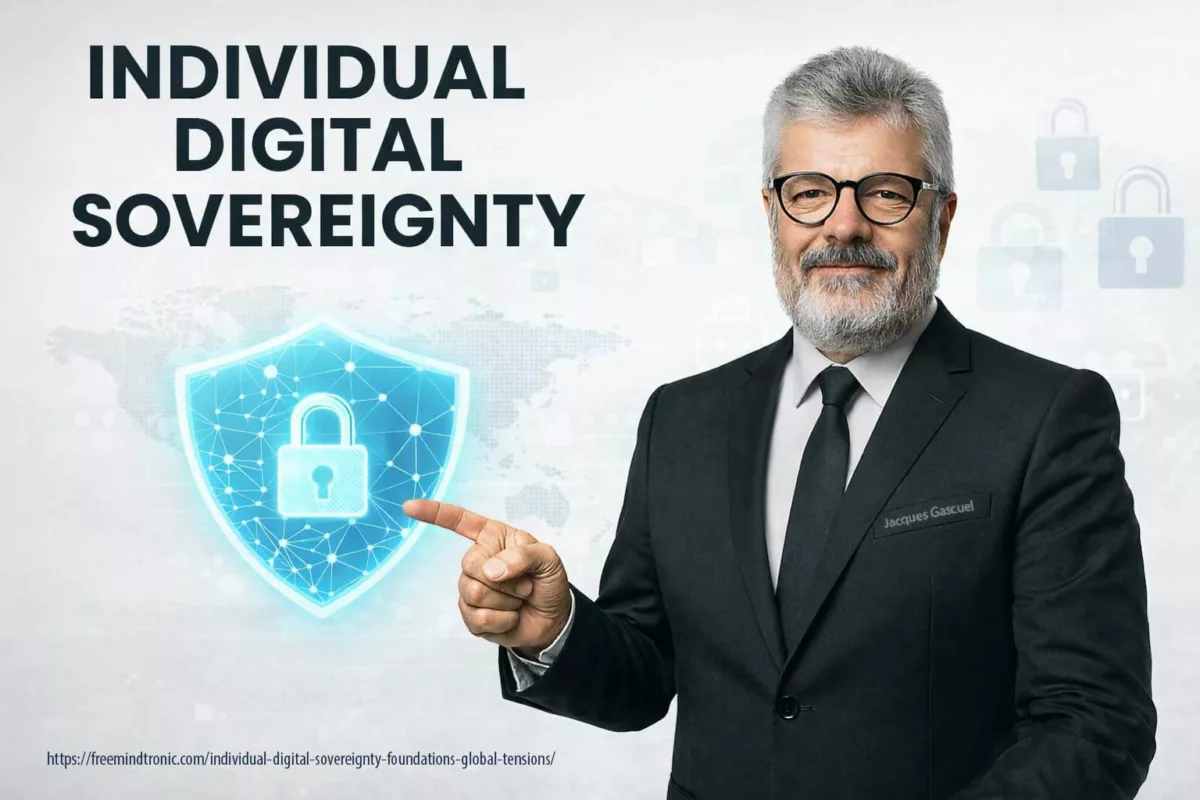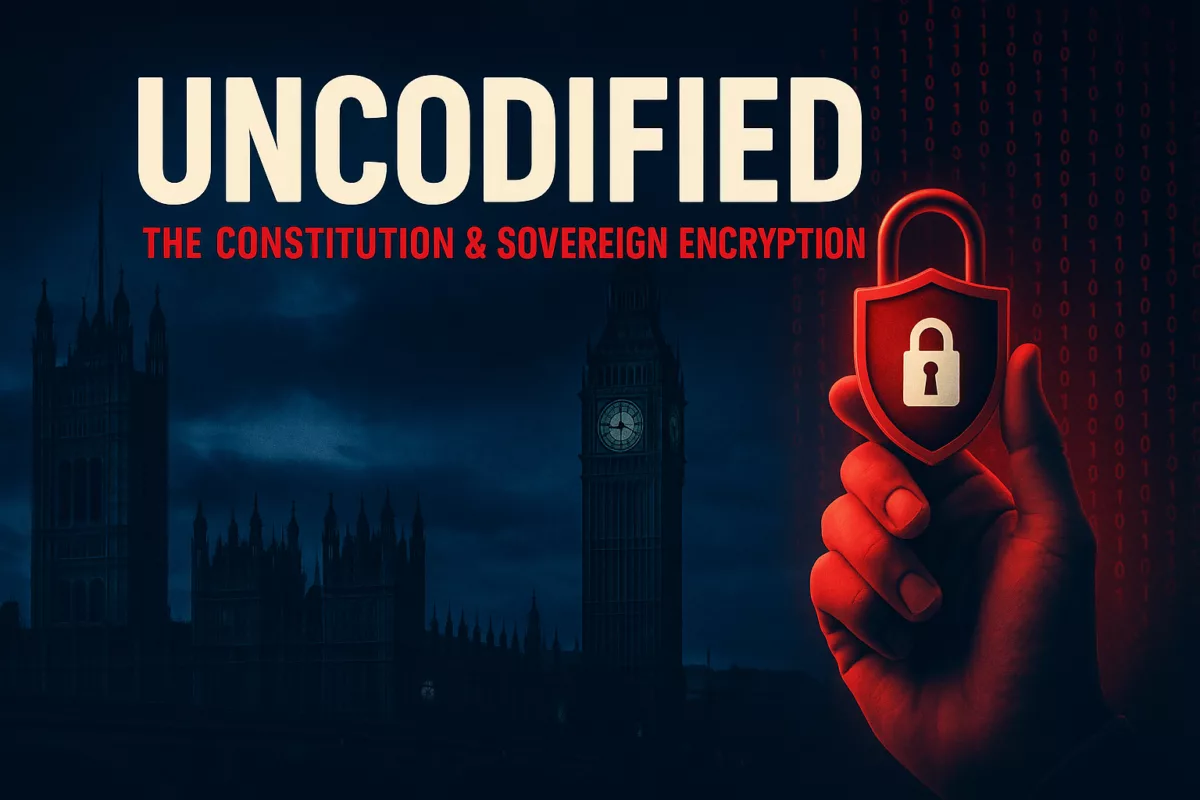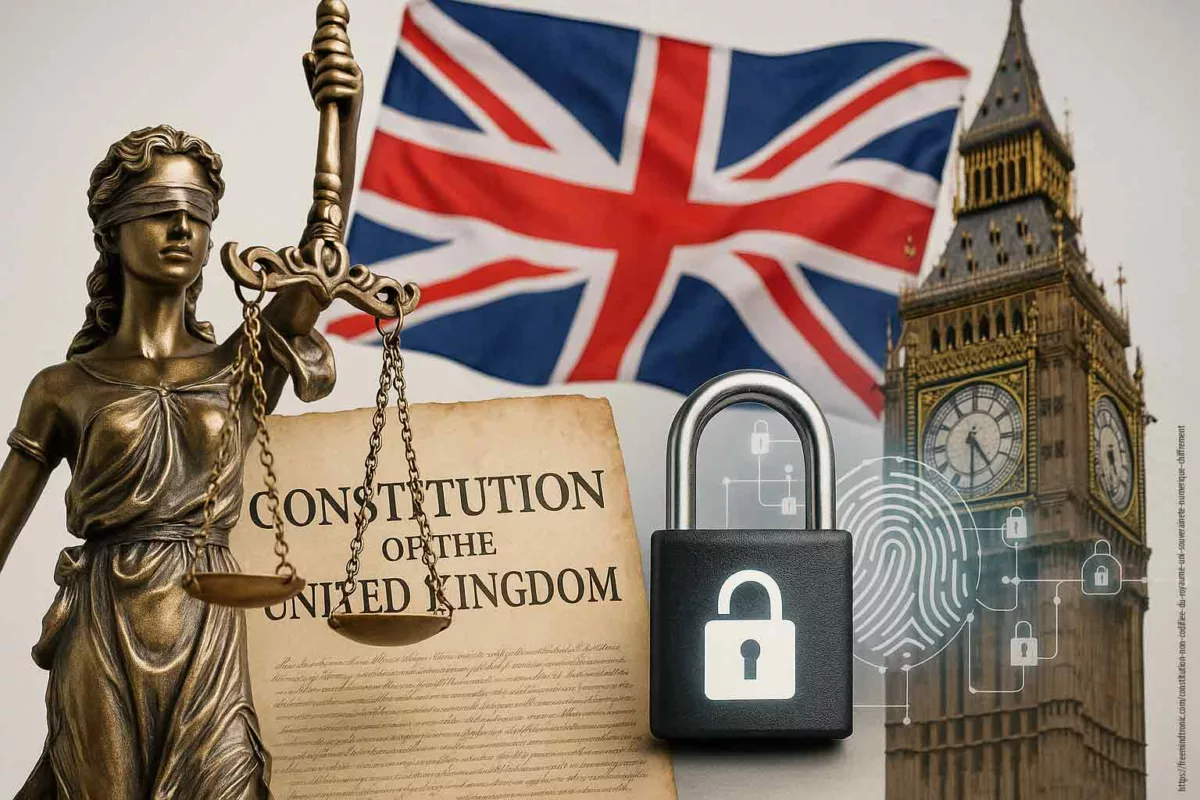Understanding Data Security in Google Workspace and Gmail Pro
Google Workspace Data Security faces significant legal challenges due to U.S. regulations. Consequently, these laws impact privacy and compliance efforts, raising crucial questions for businesses using these services. Furthermore, understanding these regulations is vital for companies aiming to protect their data. Therefore, businesses must navigate complex legal landscapes to ensure their data remains secure and compliant with both U.S. and international standards.
2026 Cyberculture
Individual Digital Sovereignty: Foundations, Global Tensions, and Proof by Design
2025 Cyberculture
Constitution non codifiée du Royaume-Uni | souveraineté numérique & chiffrement
2025 Cyberculture EviLink
P2P WebRTC Secure Messaging — CryptPeer Direct Communication End to End Encryption
2025 Cyberculture Cybersecurity Digital Security EviLink
CryptPeer messagerie P2P WebRTC : appels directs chiffrés de bout en bout
2025 Cyberculture
Souveraineté individuelle numérique : fondements et tensions globales
2025 Cyberculture
Audit ANSSI Louvre – Failles critiques et réponse souveraine PassCypher
Stay informed with our posts dedicated to Cyberculture to track its evolution through our regularly updated topics.
Gmail Pro and Google Workspace: Legal Insights on U.S. Regulation and Data Security
Gmail Pro, integrated with Google Workspace, offers robust email and collaboration services for businesses. However, data hosting in the United States raises significant legal questions about privacy and information security. This article aims to factually and legally examine Gmail Pro services within Google Workspace concerning applicable U.S. regulations. It also discusses the limitations and guarantees offered by Google to protect user data, particularly regarding end-to-end encryption..
Google Workspace Services
Google Workspace includes a comprehensive suite of productivity and collaboration services:
- Gmail for Google Workspace: Provides professional email addresses with advanced security and compliance management features.
- Google Drive: Offers secure online storage for documents and files.
- Google Meet: Enables secure video conferencing.
- Google Calendar: Facilitates calendar and appointment management.
- Google Chat and Google Spaces: Promotes instant communication and team collaboration.
Standard Gmail
Gmail is Google’s free email service, widely used by individuals and accessible via an @gmail.com email address.Unlike Gmail for Google Workspace, it lacks advanced business-specific features such as custom email addresses or compliance management tools. However, Gmail benefits from the robust security and data protection measures implemented by Google.
- Security: Like Gmail for Google Workspace, Gmail uses TLS encryption for data in transit and encryption at rest for stored data.
- Privacy: Gmail is subject to the same U.S. laws as Gmail for Google Workspace, including the USA PATRIOT Act and the Cloud Act.
Legal Challenges in U.S. Data Regulations
USA PATRIOT Act
The USA PATRIOT Act of 2001 allows U.S. authorities to request information from companies hosted in the United States for national security reasons. This includes user data stored on Google’s servers.
- Limitation and Guarantee: Google must comply with legal requests but can challenge overly broad or unfounded requests in court.However, Google’s ability to resist is limited by these laws’ nature.
Cloud Act (Clarifying Lawful Overseas Use of Data Act)
The Cloud Act of 2018 allows U.S. authorities to request data from U.S. cloud service providers, even if the data is stored abroad.
- Limitation and Guarantee: Google can contest certain foreign data requests under the Cloud Act, especially those violating other countries’ privacy laws. Yet, U.S. law generally prevails, limiting Google’s refusal of these requests.
FISA (Foreign Intelligence Surveillance Act)
FISA governs foreign surveillance and intelligence collection. Authorities can use FISA warrants to access foreign user data.
- Limitation and Guarantee: Google can seek to narrow FISA warrants via judicial processes, though they grant substantial data access for national security reasons.
Compliance with GDPR and Other International Regulations
GDPR (General Data Protection Regulation)
The EU’s GDPR imposes strict rules on personal data protection. Google Workspace strives to comply with these regulations, notably using Standard Contractual Clauses (SCC) for data transfers from the EU to the U.S.
- Limitation and Guarantee: While SCCs provide legal cover, they may not prevent U.S. authorities from data access. Google commits to notifying users when legally possible.
Standard Contractual Clauses (SCC)
SCCs are used to ensure that data transfers outside the EU comply with GDPR data protection standards.
- Limitation and Guarantee: SCCs provide a framework, but U.S. legislation restricts Google’s resistance to data requests.
NIS 2 Directive
The EU’s NIS 2 (Network and Information Security Directive) aims to enhance the security of networks and information systems across the European Union. This directive imposes increased security requirements for digital service providers and critical infrastructures.
Implications for Google Workspace and Gmail
Enhanced Compliance:Google Workspace must adhere to NIS 2, covering risk management and requisite technical and organizational security.
Incident Notification: NIS 2 mandates Google to report significant security incidents to relevant authorities, enhancing response and transparency amid cyber threats.
NIS 2 Directive vs. U.S. Regulations and Extraterritoriality of Law
The NIS 2 directive imposes strict security and incident notification obligations for digital service providers operating in the EU. However, these obligations may conflict with U.S. regulations like the USA PATRIOT Act and the Cloud Act due to the extraterritoriality of U.S. law.
Conflict of Laws and Extraterritoriality
U.S. laws permit data access from U.S. firms, even if hosted abroad, conflicting with GDPR and other European directives.This can directly conflict with the NIS 2 directive’s requirements to protect European user data and ensure timely and transparent incident notifications.
Compliance Limitations
- Legal Requests Compliance: As a U.S. company, Google must comply with legal requests from U.S. authorities, including those involving data hosted in Europe. This may limit Google’s ability to fully meet NIS 2 requirements for data protection and incident notification.
- Incident Notification: While NIS 2 requires notifying significant security incidents to EU authorities, U.S. confidentiality obligations may prevent Google from disclosing certain information about U.S. authorities’ data access requests.
Guarantees and Protective Measures
- Standard Contractual Clauses (SCC): Google uses SCCs for data transfers between the EU and the U.S. to ensure an adequate level of data protection under GDPR. However, SCCs cannot always prevent U.S. authorities from accessing data.
- Technical and Organizational Measures: Google implements technical and organizational security measures to protect user data and comply with NIS 2 requirements. This includes data encryption in transit and at rest, and strict risk management policies.
- Transparency and Notification: Google strives to notify users and competent authorities of significant security incidents, as permitted by U.S. law. However, restrictions imposed by U.S. authorities may limit Google’s ability to provide complete transparency.
Role of Freemindtronic SL’s DataShielder Solutions in NIS 2 Compliance
DataShielder solutions, such as NFC HSM, HSM PGP, and NFC HSM Auth, can play a key role in NIS 2 compliance by providing robust security measures and facilitating secure cryptographic key management.
- Enhanced Security: Using NFC HSM (Near Field Communication Hardware Security Modules), businesses can ensure their cryptographic keys are protected against unauthorized access, meeting NIS 2 security requirements.
- Incident Prevention: DataShielder solutions can help businesses effectively prevent security incidents by providing tools for secure encryption key management, strong authentication, and secure password and key management with 2FA/MFA (TOTP Time-based One Time Password).
- Regulatory Compliance: DataShielder solutions help businesses comply with NIS 2 and other international data security regulations by providing tools for secure key management and strong authentication.
- Server Independence: DataShielder solutions operate without servers, databases, or user accounts, reducing vulnerability points and ensuring better protection against data breaches, crucial for NIS 2 compliance.
Encryption and Data Security Measures
End-to-End Encryption
End-to-end encryption (E2EE) ensures data is encrypted on the sender’s device and can only be decrypted on the recipient’s device, preventing even the service provider from accessing unencrypted data.
Google’s Position on End-to-End Encryption:
- Gmail for Google Workspace uses TLS (Transport Layer Security) encryption to protect data in transit between Google servers and users, and data is also encrypted at rest on Google’s servers.
- E2EE Limitations: Gmail does not offer default end-to-end encryption for all messages. While Google offers client-side encryption options for certain services, this is not yet widespread in Gmail. Implementing full end-to-end encryption would mean Google cannot access decryption keys, conflicting with compliance requirements and U.S. laws like the USA PATRIOT Act and the Cloud Act.
Issues with U.S. Regulation:
- Legal Compliance: U.S. laws such as the USA PATRIOT Act and the Cloud Act require companies to provide data access for valid legal requests. If Google implemented full end-to-end encryption, it could not comply with these requests, creating a conflict with legal obligations.
- Resistance Capacity: Google’s ability to refuse data access is limited. Offering full end-to-end encryption would mean Google cannot access data even upon legal request, currently misaligned with regulatory compliance obligations.
Role of DataShielder Solutions in End-to-End Encryption
DataShielder solutions offer robust end-to-end encryption, addressing gaps in email services like Gmail for Google Workspace:
- Enhanced Security: Using HSM, DataShielder solutions ensure encryption keys remain protected against unauthorized access, providing true end-to-end encryption.
Why DataShielder NFC HSM, DataShielder HSM PGP, and DataShielder NFC HSM Auth are Necessary
To enhance data security in Google Workspace against various security risks, including zero-day vulnerabilities, identity theft, and legal constraints imposed by U.S. laws, companies can consider using hardware-based encryption key management solutions, 2FA secret keys, and password management solutions like DataShielder NFC HSM, DataShielder HSM PGP, and DataShielder NFC HSM Auth.
DataShielder NFC HSM
DataShielder NFC HSM (Hardware Security Module) offers an additional level of security by storing cryptographic keys on dedicated hardware, making the keys inaccessible even in case of server security breaches.
- Increased Security: Storing keys on secure hardware prevents unauthorized access even if servers are compromised.
- Compliance: Helps comply with strict regulatory requirements like GDPR by ensuring cryptographic keys remain protected.
DataShielder HSM PGP
DataShielder HSM PGP is a solution for managing PGP (Pretty Good Privacy) keys commonly used for email encryption. It allows automatic AES 256 CBC PGP encryption via segmented keys stored on various storage media freely chosen by the user.
- Email Protection: Ensures that emails encrypted with PGP remain protected, with keys stored in secure HSM.
- Access Control: Provides strict control over who can access and use cryptographic keys.
- Flexibility: Allows users to freely choose their storage media for keys, offering greater flexibility and security.
DataShielder NFC HSM Auth
DataShielder NFC HSM Auth is designed to provide strong authentication, effectively combating identity theft. It enables email service encryption, including Gmail, on NFC Android phones and Gmail webmail on computers from an NFC HSM.
- Enhanced Security: Provides strong authentication using NFC technology, reducing identity theft risks.
- Legal Compliance: Ensures system and data access complies with security and data protection regulations.
- Extended Encryption: Facilitates email service encryption on phones and computers, improving overall communication security.
Integration with Google Workspace:
- Data Security: Using DataShielder NFC HSM, DataShielder HSM PGP, and DataShielder NFC HSM Auth, companies can enhance the security of data stored and transferred via Google Workspace.
- Regulatory Compliance: These solutions help ensure companies comply with data protection regulations, particularly when sensitive data is at stake.
Summary of Legal Advantages of DataShielder Solutions
End-to-End Encryption from Human to Human
DataShielder solutions enable true end-to-end encryption, ensuring data remains encrypted from sender to recipient without third-party access, including Google.
Legal Resilience
Data remains encrypted even if Google is legally obliged to provide email access. This means even if U.S. authorities request access, they cannot read the data without decryption keys stored in DataShielder HSM.
Legitimacy of Rights
DataShielder solutions respect human rights in data protection, following international privacy and data security standards. Human rights are universal and inalienable, meaning one cannot fully enjoy a right without being able to exercise others.
Individual Sovereignty
DataShielder offers individual sovereignty by allowing users to fully control their encryption keys, ensuring data remains under their control and cannot be accessed without their explicit authorization.
Compliance with International Standards and Regulations
DataShielder solutions comply with international standards and regulations, including GDPR, ISO/IEC 27001, and other globally recognized security frameworks. This ensures not only data security but also compliance with legal and regulatory requirements, strengthening the legal position of companies using these solutions.
Relevance to the NIS 2 Directive
DataShielder solutions are particularly well-suited to meet NIS 2 directive requirements. By providing robust encryption and secure key management, they enable companies to comply with stringent security and data protection standards imposed by this directive.
- Risk Management: DataShielder helps companies manage risks by protecting encryption keys in hardware security modules, ensuring sensitive data remains inaccessible to potential attackers.
- Incident Prevention: DataShielder solutions can help companies effectively prevent security incidents by providing tools for secure key management and strong authentication.
- Serverless Operation: DataShielder solutions operate without servers, databases, or user accounts, eliminating several vulnerability points and reducing the risk of attacks and data leaks, crucial for NIS 2 compliance.
- Technical and Organizational Compliance: DataShielder HSMs provide technical means to protect data in transit and at rest, meeting NIS 2 technical requirements. Additionally, by allowing fine-grained access and authorization management, these solutions enhance organizational security measures.
By integrating DataShielder into their infrastructure, companies can not only comply with European regulations such as GDPR and NIS 2 but also improve their overall security posture against challenges posed by U.S. regulations like the USA PATRIOT Act and the Cloud Act.
Legal Challenges of Outsourcing Applicable Law
Using cloud computing services like Google Workspace poses complex legal challenges due to the outsourcing of applicable law. When a European company uses Google Workspace, data is often hosted in the U.S., subjecting it to both U.S. and European laws.
- Conflict of Laws: U.S. laws like the USA PATRIOT Act and the Cloud Act can conflict with European regulations like GDPR. For example, U.S. authorities may demand access to data under U.S. laws, while GDPR imposes strict restrictions on data transfer and access.
- Compliance Guarantee: Google uses SCCs to lawfully transfer data under GDPR, though these may not bar U.S. authorities from access. However, these mechanisms cannot always prevent U.S. authorities from accessing data.
- Notifications and Transparency: Google commits to notifying users when legally possible. However, U.S. confidentiality obligations may limit this transparency.
Security Measures and Google’s Commitments
- Data Encryption
- Google uses data encryption in transit and at rest to protect information against unauthorized access.
- Guarantee: Encryption provides technical protection against data breaches, though U.S. authorities may request decryption keys under legal mandates.
- Two-Factor Authentication
- Google offers two-factor authentication for enhanced user account security.
- Guarantee: This measure reduces the risk of unauthorized third-party access but does not prevent legal data access requests.
- Privacy Control and Transparency
- Google provides tools for administrators to manage data permissions and security.
- Guarantee: Google commits to transparency regarding government data access requests, as permitted by law. Regular transparency reports are published.
Global Statistics on Google Workspace Usage
Google Workspace is used by millions of organizations worldwide, including governments and public agencies. Notable statistics include:
- Google reports over 5 million global businesses employing Workspace.
- Government adoption: Countries like the U.S., UK, France, Japan, and Australia use Google Workspace in various ministries and agencies to enhance collaboration and productivity.
- Education usage: Google Workspace for Education is deployed in over 170 countries, supporting millions of students and teachers.
- European adoption: In France, many public institutions and private companies have adopted Google Workspace for its security and collaboration features. Germany, Spain, and the Netherlands are also major users of Google Workspace in Europe.
Usage Percentages by Country
United States
- United States Government and public agencies: Approximately 40% utilize Workspace for efficiency and collaboration.
- Private businesses: Approximately 41% use Google Workspace, including many SMEs and large companies.
United Kingdom
- Government and public agencies: About 25% use Google Workspace, particularly for secure collaboration tools.
- Private businesses: Approximately 21% use Google Workspace, reflecting significant adoption across sectors.
France
- Government and public agencies: Nearly 20% have adopted Google Workspace to improve internal management and communication.
- Private businesses: About 15% use Google Workspace, including sectors like education and financial services.
Japan
- Government and public agencies: Around 15% use Google Workspace, leveraging its security and collaboration features.
- Private businesses: Approximately 12% of Japanese companies use Google Workspace.
Australia
- Government and public agencies: About 25% use Google Workspace.
- Private businesses: Approximately 15% of Australian companies use Google Workspace.
Germany
- Government and public agencies: About 20% use Google Workspace.
- Private businesses: Approximately 12% use Google Workspace.
Spain
- Government and public agencies: About 15% use Google Workspace.
- Private businesses: Approximately 9% of Spanish companies use Google Workspace.
Netherlands
- Government and public agencies: About 20% use Google Workspace.
- Private businesses: Approximately 10% of Dutch companies use Google Workspace.
In Summary
These stats underscore Workspace’s wide adoption in public and private sectors globally. Google Workspace solutions are particularly valued for their collaboration and security capabilities, making them attractive to a wide range of users, from small businesses to large government institutions.
Sources: Exploding Topics and MarketSplash
Conclusion and Recommendations an Google Workspace Data Security
In summary, while public Gmail and Gmail for Google Workspace provide reliable email services with strong security measures, data stored in the U.S. falls under U.S. laws like the USA PATRIOT Act, the Cloud Act, and FISA. These regulations may limit Google’s ability to refuse data access requests from authorities. To comply with global standards such as GDPR, Google utilizes standard contractual clauses and provides technical safeguards like encryption and two-factor authentication.
Despite these efforts, it’s crucial for users to understand the legal implications and privacy limitations under U.S. jurisdiction, particularly the absence of default end-to-end encryption. Although Gmail lacks some advanced features of Gmail for Google Workspace, both platforms adhere to the same legal frameworks and security protocols. Gmail offers an intuitive interface and robust security features suitable for individuals and small businesses alike.
Balancing Security and Legal Compliance
To enhance data security and address legal concerns associated with Gmail and Google Workspace, businesses can integrate efficient, cost-effective solutions. Examples include DataShielder NFC HSM Lite, DataShielder NFC HSM Master, DataShielder HSM PGP, and DataShielder NFC HSM Auth. These solutions enable email encryption on NFC Android phones and Gmail webmail, ensuring that data remains solely under user control.DataShielder HSM PGP facilitates AES 256 CBC PGP encryption. It uses segmented keys stored on user-selected storage media, providing robust protection for sensitive communications and attachments in Gmail and Google Drive.








